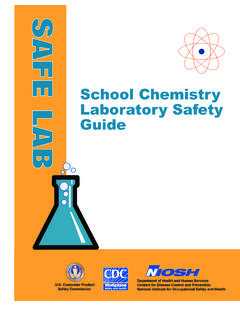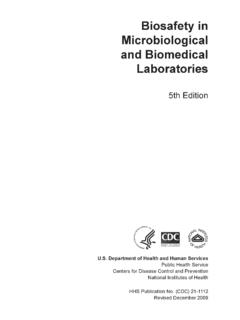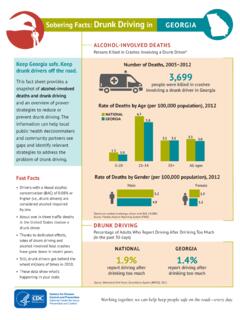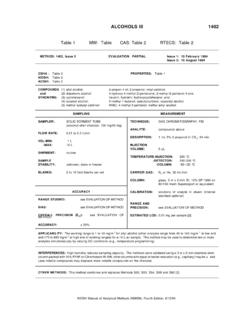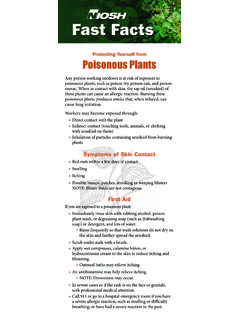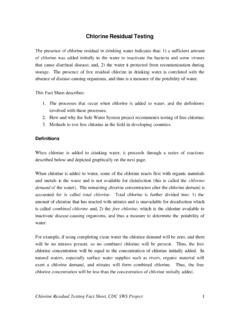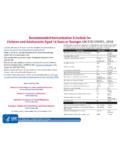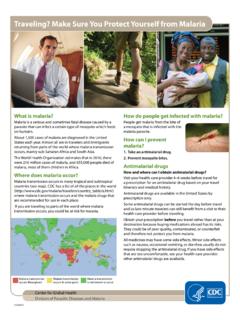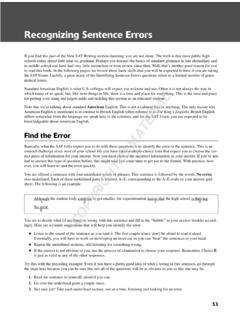Transcription of Facts About Concussion and Brain Injury
1 Facts About Concussion and Brain Injury WHERE TO GET HELP. About Concussion Signs and Symptoms Getting Better Where to Get Help Resources Department of Health and Human Service s Centers for Disease Control and Prevent ion Facts About Concussion and Brain Injury About . WHERE TO GET HELP CONCUSSIONS. About Concussion 2. Medical Help 3. Danger Signs Adults 4. Danger Signs Children 4. SYMPTOMS OF Concussion 5. Persons of All Ages 5. Young Children 6. Older Adults 7. GETTING BETTER 8. Tips for Healing Adults 10. Tips for Healing Children 11. WHERE TO GET HELP 13. Help for People with Concussion 13. Help for Families and Caregivers 14. Resources 15. Facts About Concussion and Brain Injury : Where to Get Help, is a publication of the Centers for Disease Control and Prevention, National Center for Injury Prevention and Control.
2 See A Concussion is a mild form of traumatic Brain Injury (TBI) caused by a bump, blow, or jolt to the head. Concussions can also occur from a fall or a blow to the body that causes the head to move rapidly back and forth. Doctors may describe these injuries as mild because concussions are usually not life-threatening. Even so, their effects can be serious. Understanding the signs and symptoms of a Concussion can help you get better more quickly. Leading causes of Concussion (seen in emergency departments): falls motor vehicle-related Injury unintentionally being struck by or against an obstacle assaults playing sports After a Concussion , some people lose consciousness ( knocked out ). for a short time . However, most concussions do not result in a loss of consciousness.
3 Not being able to remember events (amnesia). prior to, or following the Injury , for a period of time is another sign of Concussion . Yet, some people simply feel dazed or confused. Symptoms of Concussion usually fall into four categories: THINKING/REMEMBERING, such as difficulties See page 5 for more remembering recent events (even those information and a full list of Concussion immediately before and/or after the signs and symptoms Concussion ), or feeling mentally foggy . PHYSICAL, such as headaches or difficulty with bright light or loud noises EMOTIONAL/MOOD, such as irritability, sadness, or nervousness SLEEP DISTURBANCE, such as sleeping more or less than usual Most people with a Concussion recover quickly and fully. But for some people, symptoms can last for days, weeks, or longer.
4 In general, recovery may be slower among older adults, young children, and teens. Those who have had a Concussion in the past are also at risk of having another one and may find that it takes longer to recover if they have another Concussion . 2 Facts About Concussion and Brain Injury MEDICAL HELP. People with a Concussion need to be seen by a doctor. While most are seen in an emergency department or a doctor's office, some people must stay in the hospital overnight. Your doctor may do a scan of your Persons taking blood Brain (such as a CT scan) or other thinners should be seen tests. Other tests, known as immediately by a health neuropsychological or care provider if they have a bump or blow to the head neurocognitive tests, assess even if they do not have any your learning and memory skills, symptoms listed on page 5.
5 Your ability to pay attention or concentrate, and how quickly you can think and solve problems. These tests can help your doctor identify the effects of a Concussion . Even if the Concussion doesn't show up on these tests, you may still have a Concussion . Your doctor will send you home with important instructions to follow. Be sure to follow all of your doctor's instructions carefully. If you are taking medications prescription, over-the- counter medicines, or natural remedies or if you drink alcohol or take illicit drugs, tell your doctor. Also, tell your doctor if you are taking blood thinners (anticoagulant drugs), such as Coumadin and aspirin, because they can increase the chance of complications. Facts About Concussion 3. and Brain Injury DANGER SIGNS ADULTS.
6 In rare cases, a dangerous blood clot may form on the Brain in a person with a Concussion and crowd the Brain against the skull. Contact your doctor or emergency department right away if you have any of the following danger signs after a bump, blow, or jolt to the head or body: Headache that gets worse and does not go away Weakness, numbness or decreased coordination Repeated vomiting or nausea Slurred speech The people checking on you should take you to an emergency department right away if you: Look very drowsy or cannot be awakened Have one pupil (the black part in the middle of the eye). larger than the other Have convulsions or seizures Cannot recognize people or places Are getting more and more confused, restless, or agitated Have unusual behavior Lose consciousness (a brief loss of consciousness should be taken seriously and the person should be carefully monitored).
7 DANGER SIGNS CHILDREN. Take your child to the emergency department right away if they received a bump, blow, or jolt to the head or body, and: Have any of the danger signs for adults listed above Will not stop crying and cannot be consoled Will not nurse or eat 4 Facts About Concussion and Brain Injury SYMPTOMS OF Concussion . PERSONS OF ALL AGES. I just don't feel like myself.. Most people with a Concussion have one or more of the symptoms listed below and recover fully within days, weeks or a few months. But for some people, symptoms of Concussion can last even longer. Generally, if you feel that something is not quite right, or if you are feeling foggy, . you should talk with your doctor. Concussion symptoms are often grouped into four categories, including: THINKING/ PHYSICAL EMOTIONAL/ SLEEP.
8 REMEMBERING MOOD DISTURBANCE. Difficulty thinking Headache Irritability Sleeping more clearly Nausea or Sadness than usual Feeling slowed vomiting More emotional Sleeping less down (early on) than usual Nervousness Difficulty Balance or anxiety Trouble falling concentrating problems asleep Difficulty Dizziness remembering new Fuzzy or blurry information vision Feeling tired, having no energy Sensitivity to noise or light Facts About Concussion 5. and Brain Injury Some of these symptoms may appear right away, while others may not be noticed for days or months after the Injury , or until the person starts resuming their everyday life and more demands are placed upon them. Sometimes, people do not recognize or admit that they are having problems.
9 Others may not understand why they are having problems and what their problems really are, which can make them nervous and upset. The signs and symptoms of a Concussion can be difficult to sort out. Early on, problems may be missed by the person with the Concussion , family members, or doctors. People may look fine even though they are acting or feeling differently. YOUNG CHILDREN. Very young children ( , infants, toddlers, and preschoolers). often bump and bruise their heads. This can happen as a result of motor vehicle crashes, falls, getting hit in the head with a ball or toy, or from tricycle/bike accidents. Sometimes these events can be serious and result in a Concussion . 6 Facts About Concussion and Brain Injury Young children can have the same symptoms of a Concussion as older children, but it is harder for them to let others know how they are feeling.
10 In addition to the symptoms mentioned on page 5, call your child's doctor right away if your child seems to be getting worse or if you notice any of the following: Crying more than usual Headache that will not go away Change in the way they play, perform or act at school Change in nursing, eating, or sleeping patterns Becoming easily upset or increased temper tantrums Sad mood Lack of interest in usual activities or favorite toys Loss of new skills, such as toilet training Loss of balance, unsteady walking Poor attention OLDER ADULTS. Because concussions are often missed or misdiagnosed among older adults, be especially alert if you know that an older adult has fallen or has a fall-related Injury , such as a hip fracture. Older adults may have a higher risk of serious complications from a Concussion , such as bleeding on the Brain .
